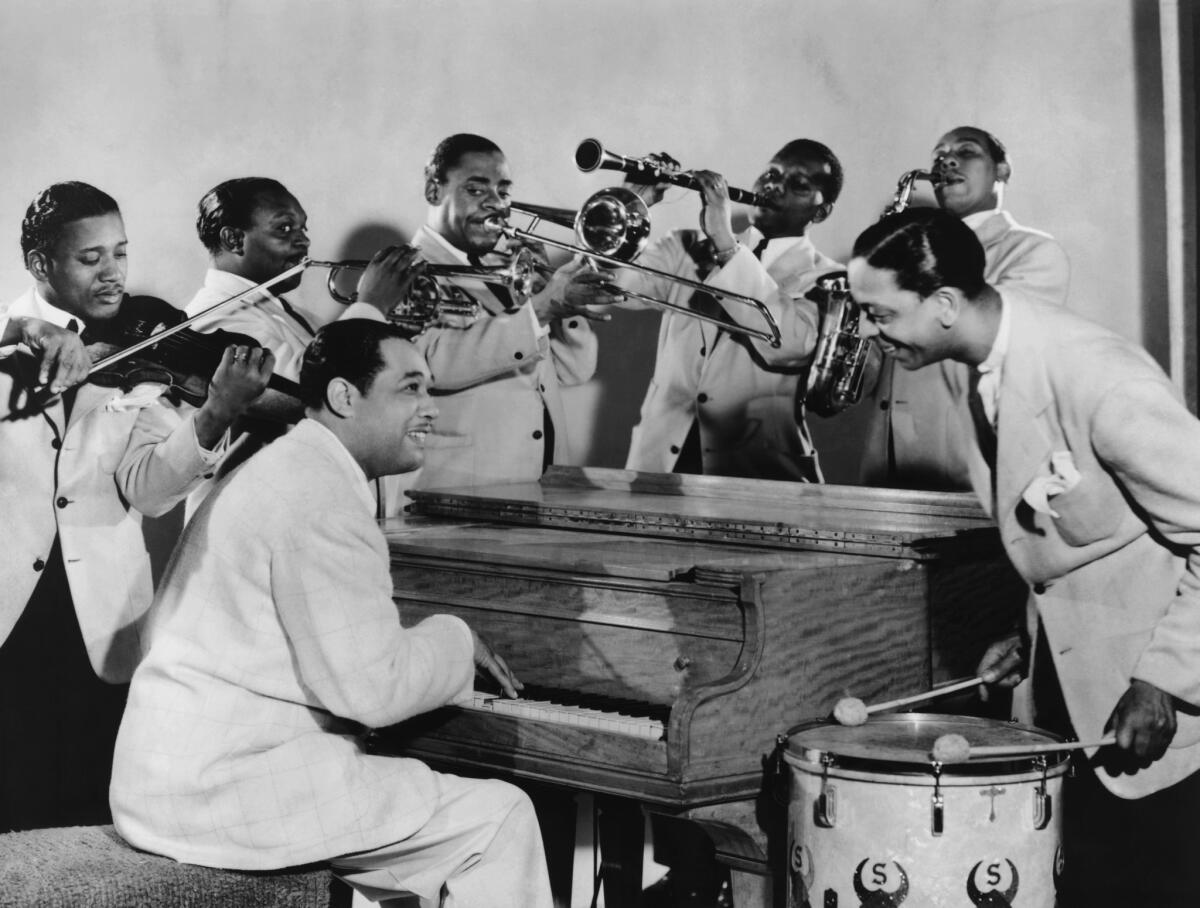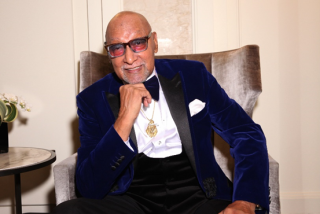From the Archives: Jazz Great Duke Ellington Dies in New York Hospital at 75

Duke Ellington at the piano with his band in 1945.
- Share via
The Duke died Friday.
Edward Kennedy Ellington, the cool, impeccable bandleader-composer whose Harlem sound stirred the world’s jazz lovers for decades, had just turned 75.
He died at Columbia Presbyterian Medical Center in New York City of lung cancer after pneumonia set in.
His more than 1,000 compositions include “Solitude,” “Sophisticated Lady,” “Mood Indigo” and such extended works as “Harlem Suite,” “Such Sweet Thunder” and “A Drum Is a Woman.”
Funeral services for Duke Ellington will be conducted Monday at 1 p.m. (EDT) at St. John the Divine Cathedral in New York, site in 1968 of the second of his sacred concerts.
“Man, you don’t stop believing in God if you were brought up with love,” he said then. “And I was brought up with love, make no mistake about that.”
Mr. Ellington, hospitalized for what was called “a respiratory ailment,” had been unable to participate in 75th birthday tributes April 29. Numerous jazz groups gathered in New York to honor him.
On Friday, a statement from the hospital and his family said he died at 3:10 a.m. from “cancer involving both lungs and pneumonia.”
It was announced that a Duke Ellington Memorial Fund was being established at the hospital for cancer research.
His son, Mercer, who played trumpet for his father, is expected to take over the band.
Among the thousands of messages pouring in was one from President Nixon, who said, “The wit, taste, intelligence and elegance that Duke Ellington brought to his music have made him, in the eyes of millions of people both here and abroad, America’s foremost composer.”
He added, “We are all poorer because the Duke is no longer with us . . .”
Mr. Ellington, the son of a blueprint maker who sometimes worked as a butler at the White House, was there in 1969 on his 70th birthday to receive from President Nixon the Medal of Freedom, the nation’s highest civilian award.
Born is Washington, D.C., he began taking an interest in the piano at about 6, finally choosing music rather than an art career.
A friend called him “Duke” because of his sophisticated bearing and dress.
He formed a band to play at society functions and married his childhood sweetheart, Edna Thompson. Their son, Mercer, was the only child of the brief marriage.
Mr. Ellington soon moved to New York, separating forever from his wife, and organized a five-man group that worked sporadically until 1927 — when the band was hired by the Cotton Club in Harlem.
Enlarged, the Ellington orchestra was to be a driving force in American music for more than 50 years, gathering fame through several years at the Cotton Club, then in radio broadcasts, tours, films and records.
The saying power of the Ellington orchestra, which survived the post-World War II years in which so many big bands faded into silence, was reflected in the durability of the Duke’s sidemen.
Saxophonist Harry Carney joined in 1926 and was still there more than four decades later. Altoist Johnny Hodges, trombonist Lawrence Brown, trumpeter Cottie Williams and drummer Sonny Greer returned after long absences.
“You don’t just join this band,” critic Leonard Feather quoted an Ellington follower as saying then. “You’re married to it.”
In 1939, Billy Strayhorn joined the band and was the Duke’s associate arranger until he died in 1967. Strayhorn, the composer of “Take the ‘A’ Train,” collaborated on such works as “Black, Brown and Beige,” Mr. Ellington’s 45-minute “tone parallel to the history of the American Negro.”
That was performed in Mr. Ellington’s 1943 Carnegie Hall concert. It was the first of his extended compositions.
Mr. Ellington’s orchestra lasted out the postwar years on royalties and then came pounding back again in the mid50s when tenor saxophonist Paul Gonsalves (who died last week in Europe) blew 27 choruses on “Diminuendo and Crescendo in Blue” at the Newport Jazz Festival.
The crowd was excited and the Ellington Band was big again.
In 1959, Arturo Toscanini commissioned Mr. Ellington to write an extended jazz work for the NBC Symphony Orchestra. The result was “Harlem,” which the Duke conducted in concert.
In 1965, he presented the first of his sacred concerts — using his orchestra, a choir and dancers — at the Grace Cathedral in San Francisco.
He was legendary for his ability to compose music any place and at any hour. In 1969, Feather noted that Mr. Ellington was working on new projects “with the vigor and dedication of an ambitious adolescent.”
Wrote Feather: “The past few weeks his band has been on a tour of one-night stands. Often Duke will spend all night in a car with his loyal Harry Carney at the wheel, then write music in the early hours and sleep all day.”
He did not compose simply for the orchestra, but for the distinctive styles of his sidemen — Cootie Williams, Harry Carney, Johnny Hodges and the others.
Since 1925, when he began recording, Mr. Ellington poured out the endless compositions — “Creole Love Call,” “Black and Tan Fantasy,” It Don’t Mean a Thing If It Ain’t Got That Swing,” “Satin Doll,” “Don’t Get Around Much Any More” . . .
There were tone poems, sacred works, television scores, ballet scores and an opera to two.
He made numerous tours throughout the world, and in fact he was recognized in Europe as a serious musician while the United States still viewed him as an entertainer who belonged in dance halls and vaudeville theaters.
In 1971, he made a remarkably successful tour in Russia, where to a stomping, applauding Moscow crowd he delivered in Russian his familiar greeting: “I love you madly!”
Mr. Ellington never seemed quite comfortable with the word “jazz” to describe his work. He once said the word “has never lost its association with those New Orleans bordellos.”
In the 1920s, he said, he tried to convince bandleader Fletcher Henderson they should call their work “Negro music.”
Eventually, however, he quit worrying about it.
In 1965, the Pulitzer advisory board rejected the suggestion of its music jury that Mr. Ellington receive a special citation.
The urbane, gentle composer with the bags under his eyes was then 56. “Fate,” he remarked, “doesn’t want me to be too famous too young.”
In addition to his sister, Ruth, and his son, Mercer, he leaves three grandchildren.
Consummate Entertainer Sammy Davis Jr. Dies at 64
Prominent Angeleno A.C. Bilicke Among the Dead
Nat ‘King’ Cole Dies of Cancer
Death Ends Career of Sen. Hiram Johnson
More to Read
Start your day right
Sign up for Essential California for the L.A. Times biggest news, features and recommendations in your inbox six days a week.
You may occasionally receive promotional content from the Los Angeles Times.






